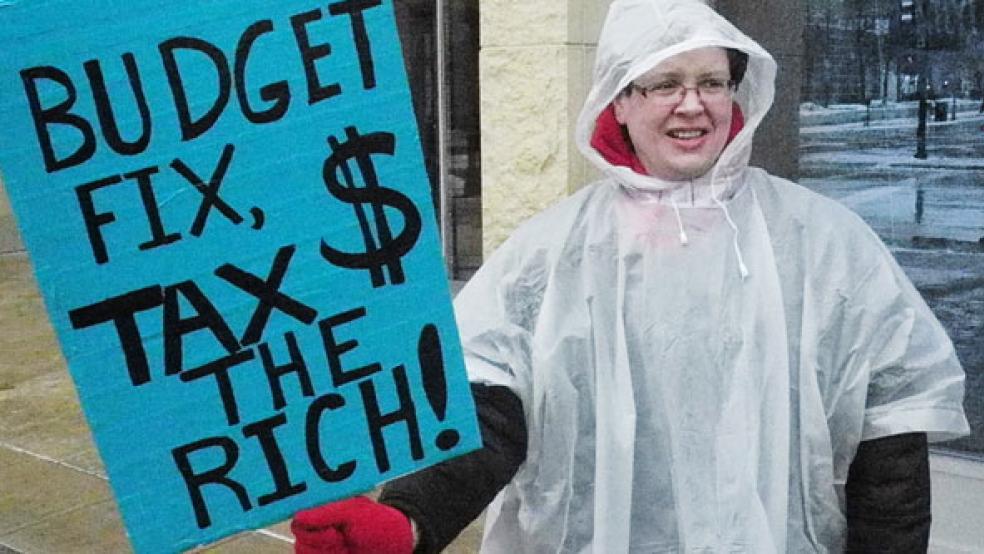Why has raising taxes on our top earners become such a battleground issue? President Obama claimed in his budget speech that our wealthiest citizens would not object to paying more in taxes. Is he right? If so, what is all the fuss about?
Top earners may worry that a shrinking number of Americans are carrying the country’s load. Only 47 percent of Americans pay federal income taxes, which suggests that high spending candidates who are more likely to tax the rich are more likely to be elected.
It has been reported that 6 families in 10 are taking more from the government than they are paying in. The Fiscal Times’ columnist James Cooper reported that in 2008 for the first time since the Depression, households in the U.S. are receiving more from the government than they are contributing through income, payroll and other taxes. These are frightening statistics, which augur ill for sensible governance. If more and more people are “takers,” they will doubtless demand more and more from the nation’s “givers.” That becomes a slippery slope- a slope that begins with raising taxes on top earners.
There’s no doubt that most Americans – seven in ten -- are quite happy to collect more taxes from high earners – and prefer that route over cutting popular programs to reduce our budget deficit. Polling on the topic, though, rarely targets those upper income types who would be on the hook; how do we know what they really think? We don’t. Instead, we assume that Republican leaders speak for the wealthy, and that they oppose hiking taxes. The GOP leadership doesn’t argue hardship, but rather promotes the notion that raising taxes deflates economic activity and is therefore dangerous during a recession.
But what happens if the economy is recovering, as appears to be the case? Why is the GOP still adamant about maintaining the Bush-era lower top rates? While many Republicans have been philosophically against raising taxes since the Reagan era, today’s hard line in the sand seems somewhat out of sync with mainstream attitudes.
For the country as a whole, Americans today are generally less cranky about their taxes than they used to be. The Gallup organization has polled Americans for decades on whether we thought the amount of federal incomes taxes we pay are too high, about right or too low. In the 1950s, over 70% of the country thought their tax burden excessive; they were right and over time rates declined. Most recently 50% said they paid too much, while 43% said their burden was “about right.”
The portion that’s unhappy is up a little over the past couple of years, but within the range established since 2001. In that year, before George W. Bush pushed through a tax cut, 65% of Americans thought their taxes were too high.
How then to explain the rise of the Tea Party and resistance to higher rates? Perhaps Americans aren’t so much unhappy with how much they pay, but rather angry about what happens to their hard-earned dollars. Another long-running poll has asked whether the government wastes “a lot,” “some”, or “not much” of the taxes we pay. Last year, 74% of respondents said that the authorities waste too much; that’s pretty damning, but not nearly as bad as the 86% who held that opinion in the 1990s.
The view that the government is playing fast and loose with our money, in other words, is not new. In fact, in yet another poll, Americans estimate that about 50 cents of every dollar collected is wasted; that opinion has been roughly the same since the mid-1980s. Imagine – Americans think that their witless authorities are throwing away half their tax revenues.
Does the current-day face-off on raising rates for the wealthy stem from an increased sense in the country that the rich are getting away Scott-free? It is true that the majority of Americans think that the rich pay too little
in taxes. However, that’s been a constant burr under the nation’s saddle for decades; some surveys actually report a decline in the intensity of this “unfairness” issue.
Yet the debate over raising taxes on the rich is fractious for a number of possible reasons. If indeed wealthy people oppose paying more in taxes, it might be because they are getting older, and more anxious about retirement. The average wealthy person is 56, and surveys show that she is most concerned about outliving her financial planning. It could also be a natural consequence of our achievement culture.
Contrary to what most of the country might think, a survey conducted by financial advisor PNC shows that 89% of the country’s wealth is earned, not inherited. Most people would like to keep the money they make.
Another theory, though, is that more and more upper-income people feel that the government is spending their money on things they disapprove of; they, along with 70% of their compatriots, think the country is on the wrong track. The Tea Party came to life after the bailouts of Wall Street and GM – perceived by many to have upended the way our economy and markets have traditionally worked. The Stimulus program, for many, was salt in the wound – hundreds of billions of dollars spent to bail out states and local governments and for innumerable boondoggles.
This is why wealthy Americans may –and should – resist higher taxes. Though they might well agree to contribute to a resolution of our budget crisis, they should insist that in response the government cut spending. But, it turns out Mr. Obama is correct – no one has asked them.






